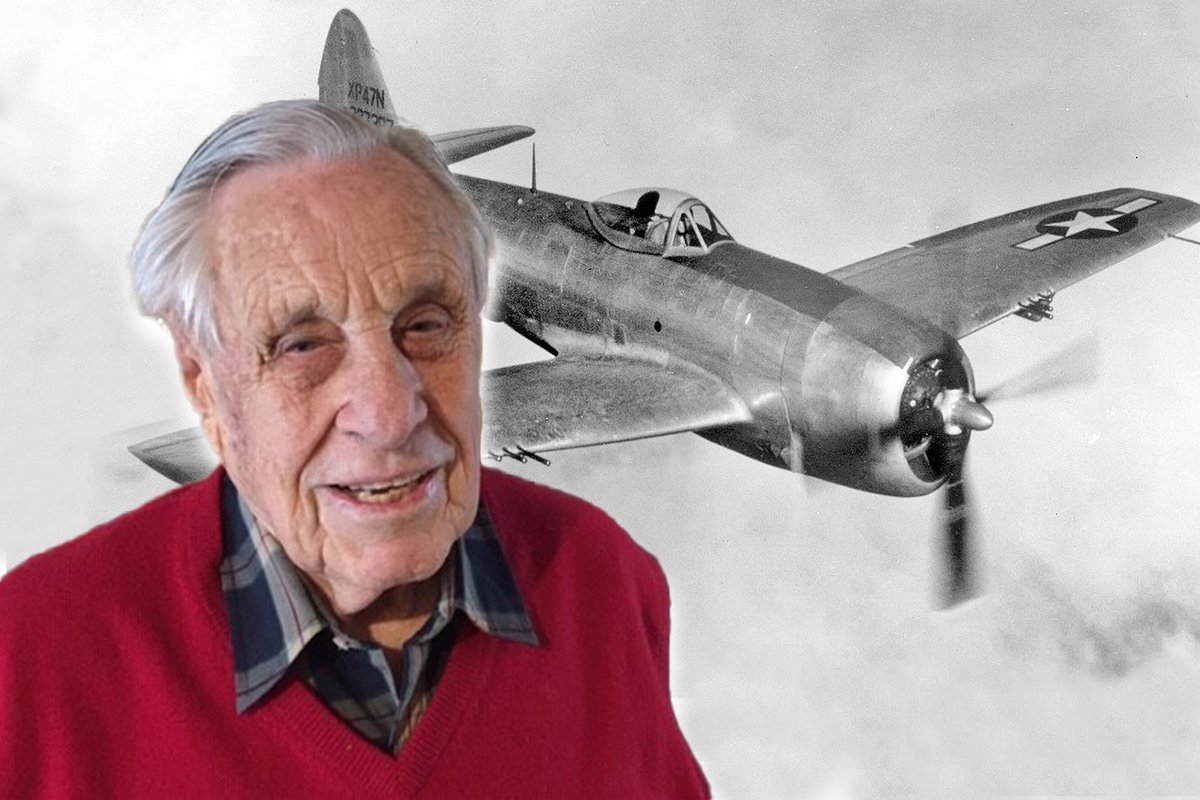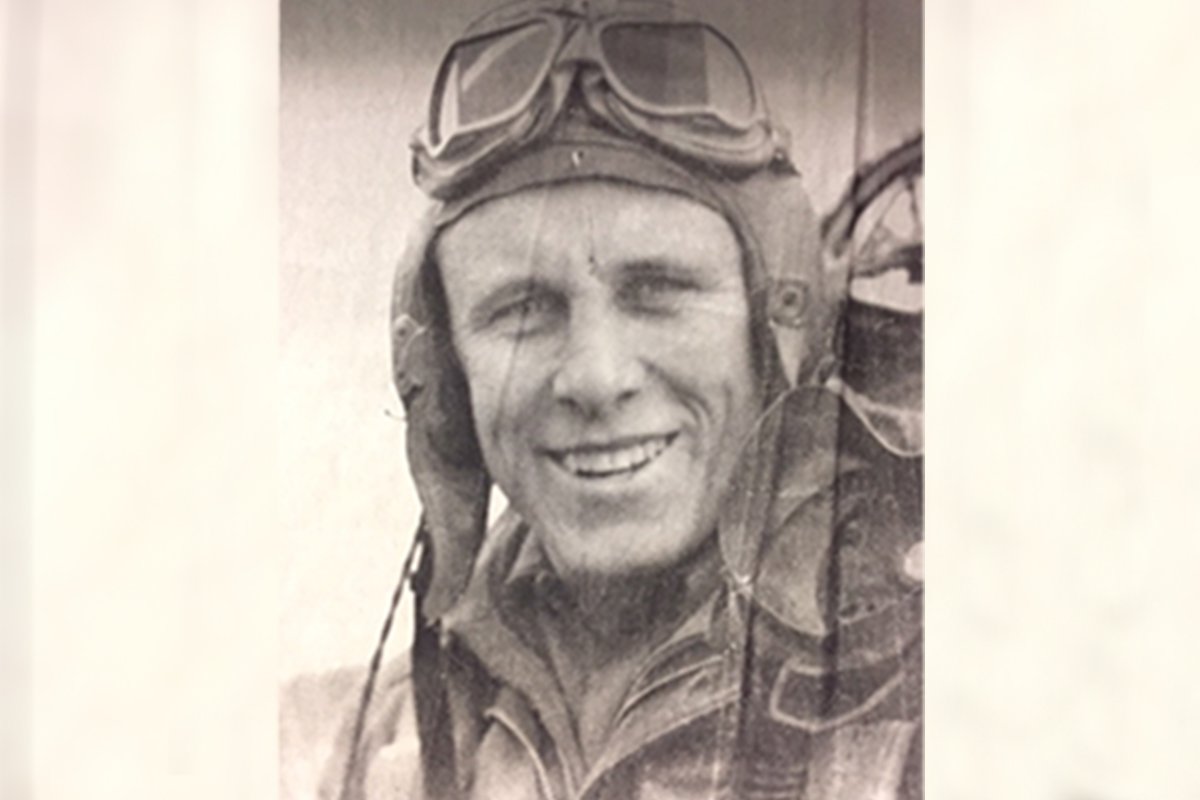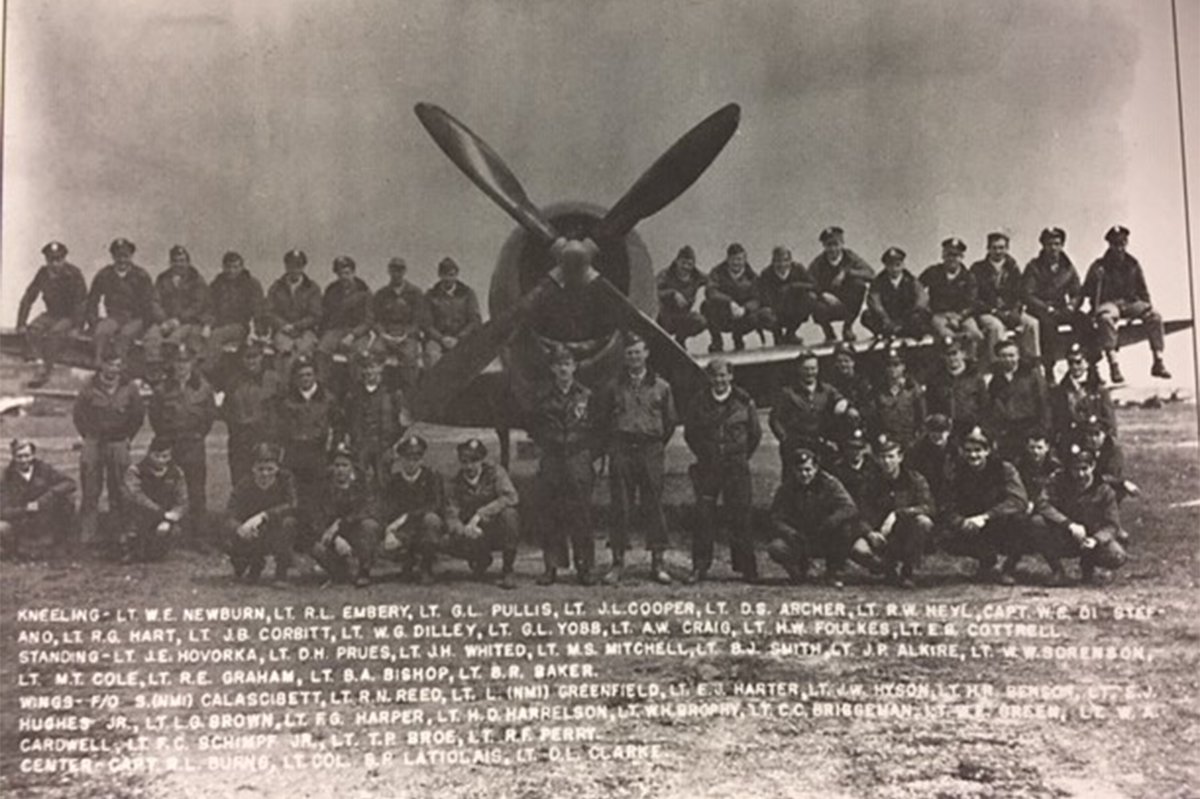‘I Kissed the Ground’ — WWII Fighter Pilot Recalls Most Intense Flight of His Life

Ed Cottrell, Army Air Corps and Air Force retiree, flew the P-47 Thunderbird during World War II. Courtesy photo provided by the 4th Fighter Wing Public Affairs.
Forty-one years after the Wright brothers historic first flight at Kitty Hawk, North Carolina on Dec. 17, 1903, Lieutenant Colonel, Ed Cottrell, Army Air Corps and Air Force Reserve veteran, found himself in a P-47 Thunderbolt, staring down the barrel of an enemy cannon aimed at his flight leader.
“I radioed him to let him know that the [German] ME-109s were coming,” said the almost 100-year-old remembering that fateful Dec. 17, 1944 flight. “The aircraft turned toward me and I could see his 20 mm cannon blinking. All of a sudden, there was a big thud and explosion. Black oil was all over my windshield and the motor started chugging.”
Cottrell was a 22 year old fighter pilot in the Army Air Corps during World War II. This was his first overseas deployment during the largest and deadliest war in history.
Cottrell learned to fly in between his freshman and sophomore year at Slippery Rock University, Pennsylvania. He grew up in Slippery Rock and chose to attend the local university where his father taught and his mother was close by.
“The government had a program for students who were interested in flying where you could go to an airfield and take lessons in a Piper aircraft and get a pilot’s license,” Cottrell said.
While at university, Cottrell studied health and physical education, but during his junior year in February 1943, he was called to active duty in the Army Air Corps. After basic military training, Cottrell went to Wisconsin, where his education came in handy.

“Since I was close to graduation, the commander of our troops found out I was trained in health and physical education and asked me if I could run the physical training program,” Cottrell added.
Cottrell earned his wings by April returned home to marry his sweetheart Mildred “Millie,” received orders to Utah. Then, he received orders to the European Theatre.
“I was assigned to the 48th Fighter Group, 493rd Fighter Squadron, in Cambrai, France, as a fighter pilot” said Cottrell.
On December 17, 1944, Cottrell’s fighter group entered a conflict just as the Battle of the Bulge was beginning. After his P-47 Thunderbolt fighter jet was hit and the oil completely obscured his viewpoint, Cottrell said he realized more enemy jets were on his tail.
“I was about maybe 2,000 feet up, going 135 mph, almost stalling as my motor continued to fire – but not very well. I looked over to my right and there was an ME-109,” Cottrell remembered. “I looked to my left and there was another ME-109; they criss-crossed behind me. I was waiting for them to shoot but they didn’t. Instead they did a formation veryclose to me and we chugged along. We got close to the bomb line, they made a circle with their first finger and thumb, waved and peeled off.”
Cottrell doesn’t know why the enemy jets did not take him down that day.
“I spotted the runway and went right towards it,” he remembered. “Before my wheels touched down, my engine froze and the propeller stopped but I did get down. I jumped out, kissed the ground and thanked the Lord I was safe.”

Sadly, Cottrell lost his roommate that day, Arthur Summers, when his plane was hit and crashed into a field. Cottrell lost another roommate, Theodore H. Smith on Jan. 1, 1945. However, nearly 76 years after he lost his two roommates, Cottrell still wanted to honor them.
“When I was 90, I had the opportunity to jump out of a plane with [master jumper] Mike Elliot,” explained Cottrell. “I made a promise that if I were alive at 100 and physically possible, I was going to do it again in memory of my two buddies who were killed in WWII.”
Just two months before his 100th birthday, on Nov. 8, 2021, Cottrell kept his word and parachuted at Fort Bragg, North Carolina.
After the war, Cottrell returned to America and started his family. He later decided to enlist in the Air Force Reserves, and served for 28 years. As a reservist, Cottrell worked on establishing the Air Force Academy as an educational officer. When he wasn’t working as a reservist, Cottrell was a professor at West Chester University, and taught golf clinics across the nation.
“I have had a great life,” Cottrell said. “I thank the Lord that we have such men and women now serving in our military. We are fortunate in this country to have this group of people. I would love to be on the flight line and shake their hand every time they go off and come back because they’re the backbone of this country.”
Read Next:

Coffee or Die is Black Rifle Coffee Company’s online lifestyle magazine. Launched in June 2018, the magazine covers a variety of topics that generally focus on the people, places, or things that are interesting, entertaining, or informative to America’s coffee drinkers — often going to dangerous or austere locations to report those stories.
BRCC and Bad Moon Print Press team up for an exclusive, limited-edition T-shirt design!
BRCC partners with Team Room Design for an exclusive T-shirt release!
Thirty Seconds Out has partnered with BRCC for an exclusive shirt design invoking the God of Winter.
Lucas O'Hara of Grizzly Forge has teamed up with BRCC for a badass, exclusive Shirt Club T-shirt design featuring his most popular knife and tiomahawk.
Coffee or Die sits down with one of the graphic designers behind Black Rifle Coffee's signature look and vibe.
Biden will award the Medal of Honor to a Vietnam War Army helicopter pilot who risked his life to save a reconnaissance team from almost certain death.
Ever wonder how much Jack Mandaville would f*ck sh*t up if he went back in time? The American Revolution didn't even see him coming.
A nearly 200-year-old West Point time capsule that at first appeared to yield little more than dust contains hidden treasure, the US Military Academy said.












